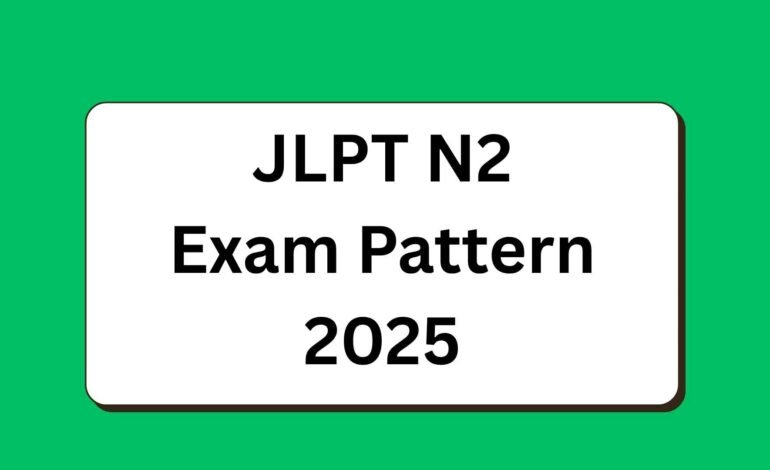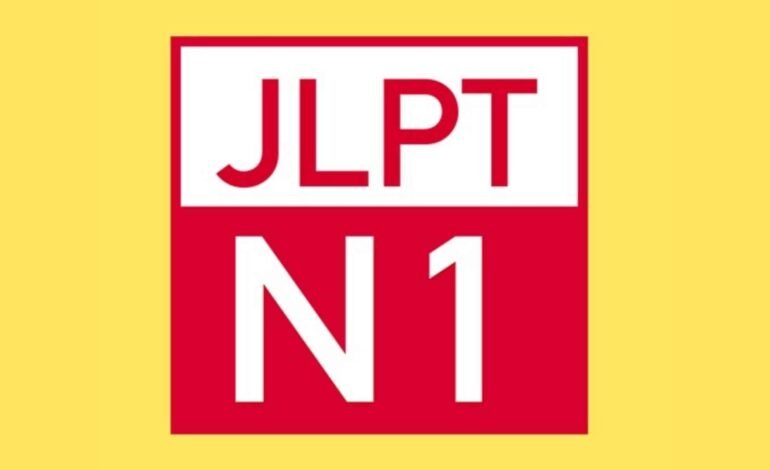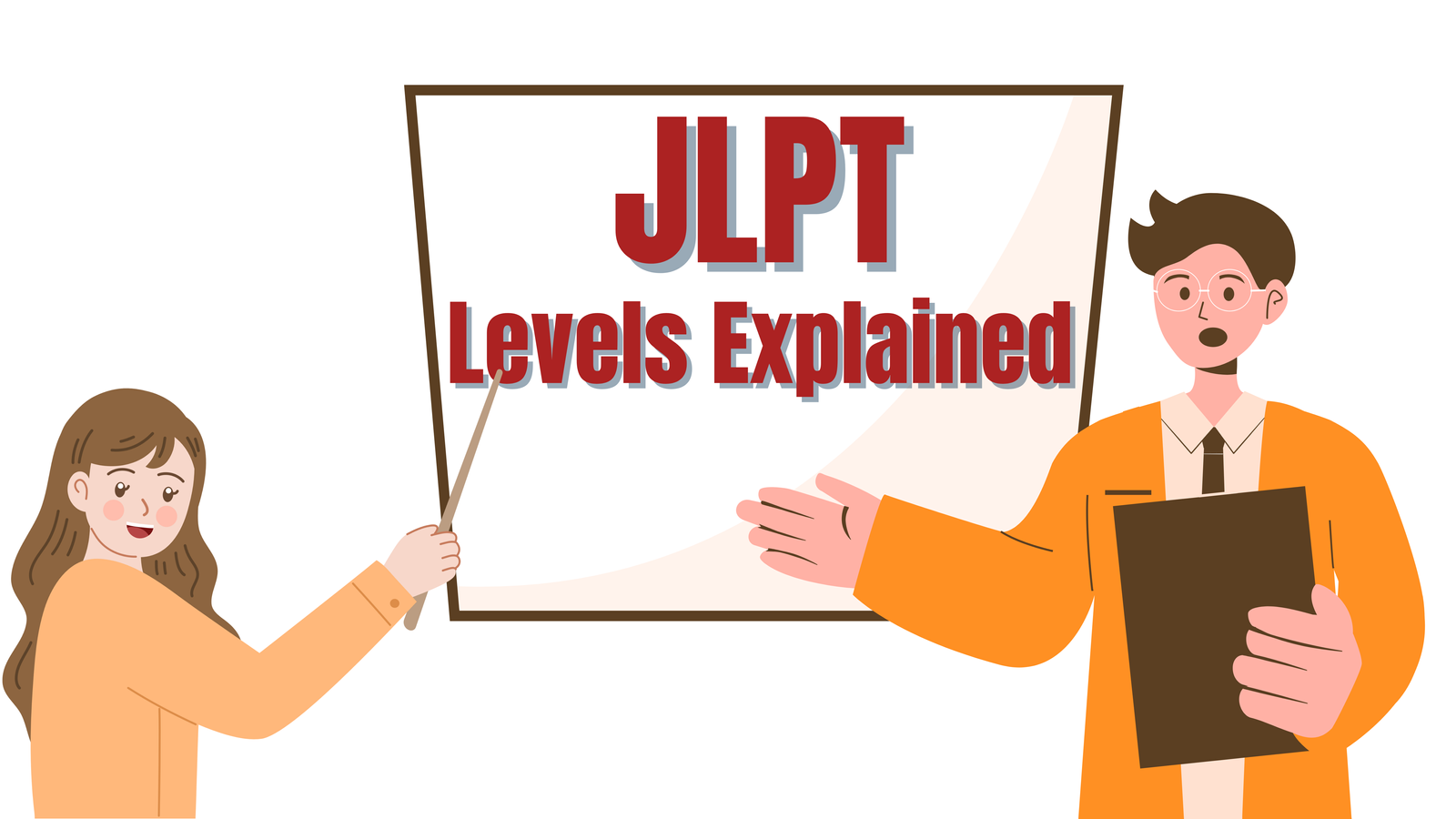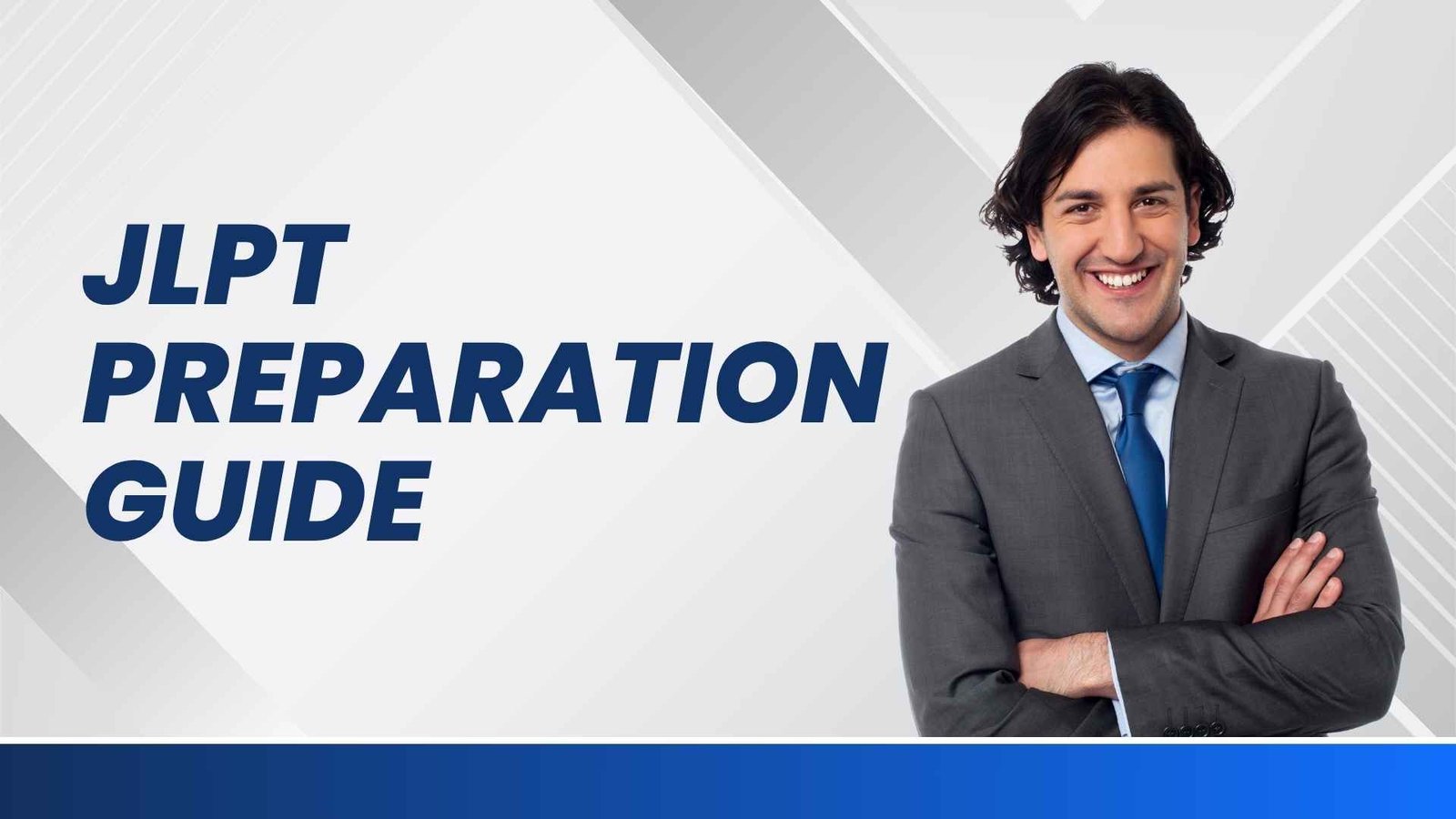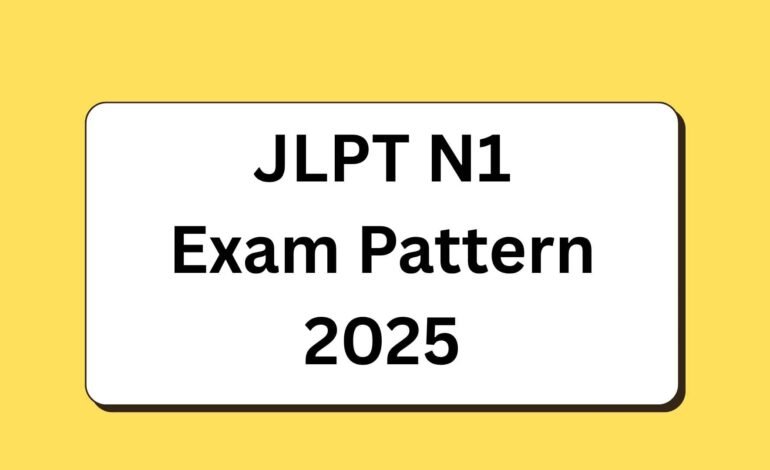
JLPT N1 Exam Pattern 2025 – Comprehensive Guide to Advanced Japanese Proficiency
The Japanese Language Proficiency Test (JLPT) N1 is the pinnacle for non-native Japanese speakers, demonstrating an advanced understanding of the language in a wide range of situations. If you’re aiming for JLPT N1 Exam Pattern 2025, this guide will provide a detailed breakdown of the exam pattern, scoring, and essential preparation tips to help you achieve this significant milestone. Official Website.
What is the JLPT N1?
The JLPT N1 assesses your ability to understand Japanese in diverse, complex contexts, including academic, professional, and formal settings. It requires a deep comprehension of nuanced vocabulary, advanced grammar, and the capacity to grasp intricate details in both written and spoken Japanese. Passing the N1 signifies a high level of proficiency, often a requirement for higher education in Japan or professional roles where advanced Japanese is essential.
JLPT N1 Exam Structure and Sections
The JLPT N1 exam is divided into three core sections, all consisting of multiple-choice questions. There are no speaking or writing components.
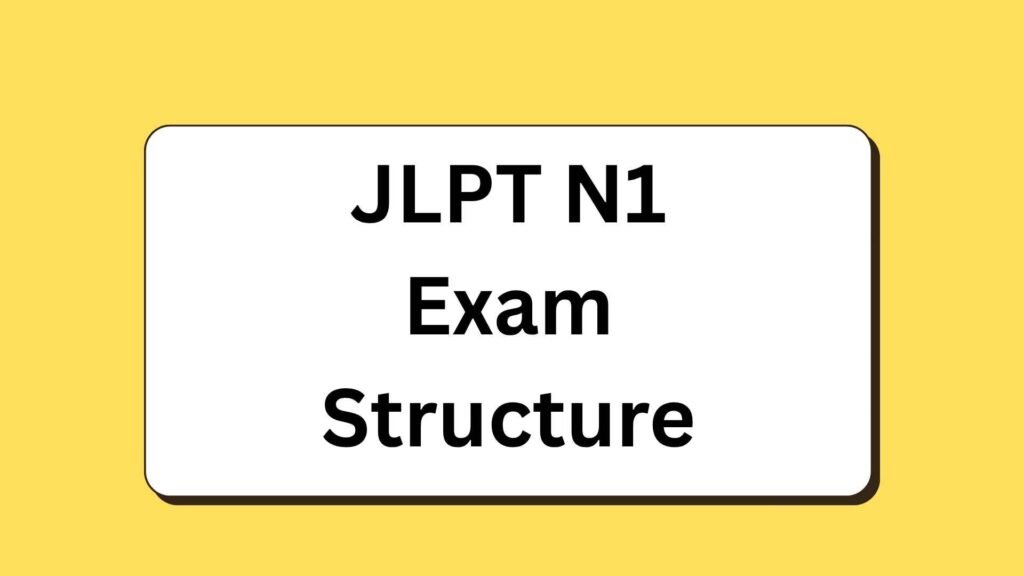
- Language Knowledge (Vocabulary & Grammar)
- Reading Comprehension
- Listening Comprehension
Let’s delve into each section:
1. Language Knowledge (Vocabulary & Grammar)
This combined section tests your mastery of advanced Japanese vocabulary and complex grammatical structures.
- Vocabulary: At the N1 level, you are expected to know approximately 10,000 to 15,000 words. This includes:
- Advanced vocabulary: Words used in formal writing, news articles, academic papers, and professional contexts (e.g., terms related to law, science, business, abstract concepts).
- Idioms and compound words: Frequently used in both writing and speech.
- Proverbs and set phrases: To understand nuanced expressions. Questions will test your ability to read Kanji, identify synonyms, choose appropriate words based on context, and understand word usage.
- Kanji: You’ll need to recognize and understand at least 2,000 commonly used Kanji (Jōyō Kanji). This includes rare and advanced Kanji seen in literature, legal documents, and formal announcements, along with their multiple readings (Onyomi and Kunyomi).
- Grammar: The N1 grammar is highly complex and subtle. You’ll need to master:
- Causative-passive forms and honorific expressions.
- Advanced sentence-ending particles (e.g., 〜ものの, 〜わけではない, 〜にすぎない).
- Nuanced conjunctions to express comparison, contrast, speculation, and obligation (e.g., 〜としても (even if), 〜わけがない (there’s no way that…)). Questions will require you to select the appropriate grammar form to complete sentences, compose accurate sentences, and understand the suitability of sentences for text flow.
2. Reading Comprehension
This section is heavily weighted and demands the ability to read and understand highly complex Japanese materials. These include:
- Newspaper editorials and formal reports
- Essays and critiques with logical structures and opinions
- Research articles and business documents
- Literary texts with layered meanings and metaphors
You will need to:
- Infer tone, implied opinions, and subtle emotional context.
- Understand logical flow and compare perspectives.
- Analyze argumentative texts with critical thinking.
- Retrieve specific information from notices and other materials.
- Comprehend thematic content and the writer’s intent in profound texts.
3. Listening Comprehension
The N1 listening section assesses your ability to understand spoken Japanese in fast-paced, real-time, and formal settings. You’ll listen to:
- Lectures, seminars, and academic interviews.
- News reports and formal discussions.
- Business meetings or workplace conversations.
You will be expected to:
- Grasp speaker intent, unspoken meanings, and cultural nuances.
- Understand spoken information in complex scenarios.
- Identify specific information needed to resolve issues or take appropriate action.
- Comprehend the general outline and logical structures in longer conversations.
JLPT N1 Exam Structure and Time Allotment (2025)
The JLPT N1 exam has a total duration of approximately 170 minutes and consists of around 110-120 questions.
Here’s a breakdown:
| Section | Approximate Questions | Time Allotment | Max Score |
| Language Knowledge (Vocabulary & Grammar) & Reading | ~60-70 questions | 110 minutes | 120 points |
| Listening Comprehension | ~40-50 questions | 55 minutes | 60 points |
| Total | ~110-120 questions | 165 minutes | 180 points |
Export to Sheets
Note: The Language Knowledge (Vocabulary & Grammar) and Reading sections are administered as one combined section with a total time of 110 minutes.
JLPT N1 Passing Score (2025)
To pass the JLPT N1, you need to meet two criteria:
- Overall Pass Mark: A total score of at least 100 points out of 180.
- Sectional Pass Marks: A minimum score of 19 points in each of the three scoring sections (Language Knowledge, Reading, and Listening).
This means that even if your total score is 100 or above, you will fail the exam if you score below 19 points in any single section. A balanced performance across all areas is crucial.
Key Dates for JLPT 2025 in India
The JLPT is typically held twice a year, in July and December.
- First Test: Sunday, July 6, 2025
- Second Test: Sunday, December 7, 2025
Always check the official JLPT India website or local test center announcements for exact registration periods and confirmed dates for 2025, as registration often opens several months in advance (e.g., March-April for July test, August-September for December test).
Strategies for JLPT N1 Success
Passing the JLPT N1 requires dedication and a well-structured study plan.
- Immerse Yourself in Advanced Materials:
- Reading: Regularly read Japanese newspaper editorials (e.g., Asahi Shimbun, NHK News Web Easy for a slightly simpler version), academic articles, novels, and critiques. Focus on understanding complex sentence structures, logical arguments, and the author’s intent.
- Listening: Listen to Japanese news broadcasts, academic lectures, debates, and podcasts. Pay attention to natural speaking speed, various accents, and implied meanings. Practice distinguishing subtle differences in tone and vocabulary.
- Intensive Vocabulary and Kanji Study:
- Expand your vocabulary daily: Utilize flashcard apps (Anki, Quizlet) with N1-specific decks. Focus on less common words, abstract terms, and formal expressions.
- Master N1 Kanji: Practice recognizing approximately 2,000 Kanji and their multiple readings. Understand Kanji compounds and their nuanced meanings.
- Deep Dive into Advanced Grammar:
- Study N1 grammar patterns from specialized textbooks and online resources.
- Practice forming complex sentences using these structures and identify their usage in various contexts. Don’t just memorize forms; understand their subtle implications.
- Practice with Mock Tests:
- Regularly take full-length JLPT N1 practice tests under timed conditions. This is essential for familiarizing yourself with the format, managing your time, and identifying your weak areas.
- Analyze every mistake to understand the underlying reasons and target those specific areas for improvement.
- Develop Critical Thinking Skills:
- The N1 exam often requires you to infer meaning, understand implications, and identify the logical flow of arguments. Practice critical reading and listening to develop these skills.
- Consistency is Key:
- Allocate dedicated study time each day, focusing on different sections and skills. Consistency over intensity is more effective for long-term retention.
Need Expert Guidance for JLPT N1 Preparation?
The JLPT N1 is a challenging yet rewarding examination. If you’re an Indian learner seeking structured guidance, personalized study plans, or clarification on complex Japanese concepts, our team is here to support you. Click Here.
Don’t let the vastness of the N1 syllabus overwhelm you. Contact us for expert advice, focused study sessions, and strategies tailored to your learning style.
Call us now at +918700956038 and take the decisive step towards mastering the JLPT N1!

